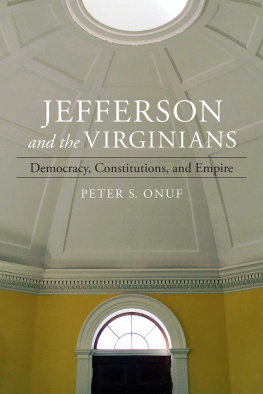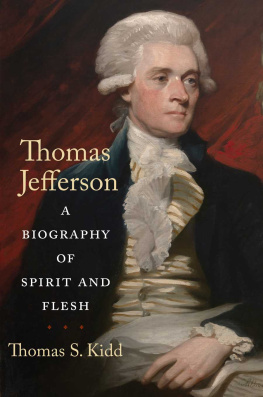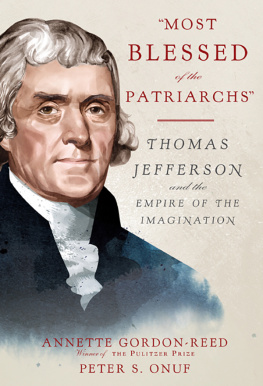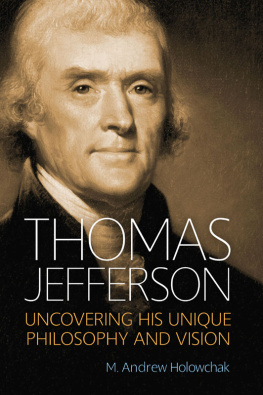University of Virginia Press
2007 by the Rector and Visitors of the University of Virginia
All rights reserved
Printed in the United States of America on acid-free paper
First published 2007
1 3 5 7 9 8 6 4 2
LIBRARY OF CONGRESS CATALOGING-IN-PUBLICATION-DATA
Onuf, Peter S.
The mind of Thomas Jefferson / Peter S. Onuf.
p. cm.
Includes bibliographical references and index.
ISBN-13: 978-0-8139-2578-3 (cloth : alk. paper)
ISBN-13: 978-0-8139-2611-7 (pbk. : alk. paper)
1. Jefferson, Thomas, 17431826Political and social views. 2. Jefferson, Thomas, 17431826Philosophy. 3. Jefferson, Thomas, 17431826Influence. I. Title.
E332.2.059 2007
973.46092dc22
2006014637
Acknowledgments
T homas Jefferson has been a fascinating and rewarding subject for me for many years. He has also introduced me to new friends in the community of Jeffersonians, helped me renew and sustain old friendships, and brought excellent students to Charlottesville to study Jefferson and his times with me. Among my former students, Andy Burstein and Joanne Freeman in particular have helped me understand the Sage of Monticello. Their influence will be apparent in many of the essays collected here. I have also learned much from visiting scholars, including Csaba Levai from Hungary and Ari Helo from Finland, the latter a coauthor of one of the essays in the present collection.
Under the direction of Doug Wilson, Jim Horn, and Andrew Oshaughnessy, the Robert H. Smith International Center of Jefferson Studies at Monticello has been a magnet for Jeffersonians; Kenwood and, since its construction, the Jefferson Library have been the site for many stimulating seminars and conferences. The Early American Seminar at the ICJS is an ongoing source of intellectual excitement.
My good friend Tom Dowd, formerly of the University of Virginias School of Continuing and Professional Studies, enabled me to get to know an extraordinarily diverse and accomplished group of students who attended his summer Symposia on the Lawn over the past decade. I prepared the essay Jeffersons Religion for Toms most recent symposium: it is dedicated to him.
Dick Holway at the University of Virginia Press has been a great editor and friend for many years. Without his support, this book would never have been published.
I also wish to acknowledge the continuing and enriching friendship of the Amigos, including el Jefe, David Konig, Alan Taylor, Paul Gilje, and Don Higginbotham. This book is dedicated to two of the Amigos, Annette Gordon-Reed and Jan Ellen Lewis. Annette and my sometime coauthor Jan understand Jefferson better than anyone I know. They are also wonderful friends.
Introduction
N otwithstanding the assaults of generations of iconoclastic critics, Thomas Jefferson remains an American icon. A touchstone for partisans of all persuasions, the author of the Declaration of Independence has risen above partisanship as Americas inventor, the great apostle of democracy and national self-determination. His eloquent formulations of self-evident truths constitute the American creed: all men are created equal; they are endowed by their Creator with inherent and unalienable Rights, including Life, Liberty, and the pursuit of Happiness; and the governments men institute to secure these rights derive their just powers from the consent of the governed.
Historians may insist, and Jefferson would have agreed, that these principles were hardly original; they may acknowledge that he was a gifted writer but emphasize the crucial editorial role of fellow congressmen who purged the document of most (but not all) of its embarrassing rhetorical excesses; or they may be appalled by the bald hypocrisy of a Virginia slave owner holding forth on the rights of man. But Jeffersons language and the man himself seem impervious to historians qualifications and caveats. Because modern Americans know what Jefferson really meant, they know their man. They think they know Jefferson because Jeffersonin visionary momentsseems to know them. Jeffersons Declaration announced a new epoch in world history, transforming a provincial tax revolt into the opening
The essays in this collection are not designed to debunk, diminish, or demolish either the Jefferson image or the mythic narrative of our history that make Jefferson and his fellow founders loom so large in the national imagination. Instead, I hope to raise fresh questions about what was on Jeffersons mind as he looked forward, so hopefully and yet so fearfully, to an uncertain future.
Jeffersons language continues to resonate, but its radical edge has been lost. In an eighteenth-century world where all men were self-evidently created unequal, the principle of equality threatened to turn the world upside down, subverting social and political order, even family governance. But what does equality mean now, when most right-thinking Americans take it for granted, assuming it to be compatible withand even to make legitimatethe glaring inequalities in contemporary society that we also take for granted? And what about that chosen country, now that there is no longer room enough for further waves of settlement and improvement? In what sense are Americans still Jeffersons chosen people, the virtuous, independent yeoman farmers who surged westward to conquer a continent, now that family farmers have virtually disappeared? Are Americans chosen to act as proxies and exemplars for the human race, or chosen instead to be uniquely free and unequally prosperous?
My point is not that complacent and conservative Americans have betrayed Jeffersons radical legacy, but, rather, to underscore what should be obvious: we live in a radically different world than Jeffersons, yet one that must remain inextricably linked to ourssimultaneously foreign, yet uncannily familiaras long as the nation itself survives. The historians challenge is to sustain the tension between past and present, to restore our subjects to their own uncertain world while reconnecting it to ours by fresh translations from the increasingly foreign language of a distant time and place. The national idea is timeless and transcendent, an ongoing collaboration across the generations. The historians role is to protect us against facile appropriations of the past to serve present purposes, to challenge the assumption that the founders original intentionswhether they are supposed to be liberal or conservativecan be fully known and should be authoritative guides to future action. The myth of nationhood that Jefferson and his fellow nation makers articulated and enacted encourages such abuses by collapsing the past into the present. In response, historians must struggle to keep past and present apart, not to destroy, but rather to reinvigorate our cross-generational conversation.
My hope is to spark some conversations with and about Thomas Jefferson, to engage in the rich and complex legacy he has left us in his voluminous correspondence as well as in the great public papers that have played and will play such a crucial role in defining the meanings and purposes of American nationhood.
Who Was Thomas Jefferson?
If Americans know Jefferson, they dont know much about his private life. Jefferson could be indiscreet, but he kept his own secrets, destroying his correspondence with his wife, Martha, and revealing nothing about his long-term relationship with his slave Sally Hemings. Jeffersons autobiography (drafted in 1821) is a sketch of his public career, virtually bereft of illuminating details about his private life. It was, instead, yet another effort to secure his legacy as a Revolutionary founder and to guarantee his own everlasting fame.









